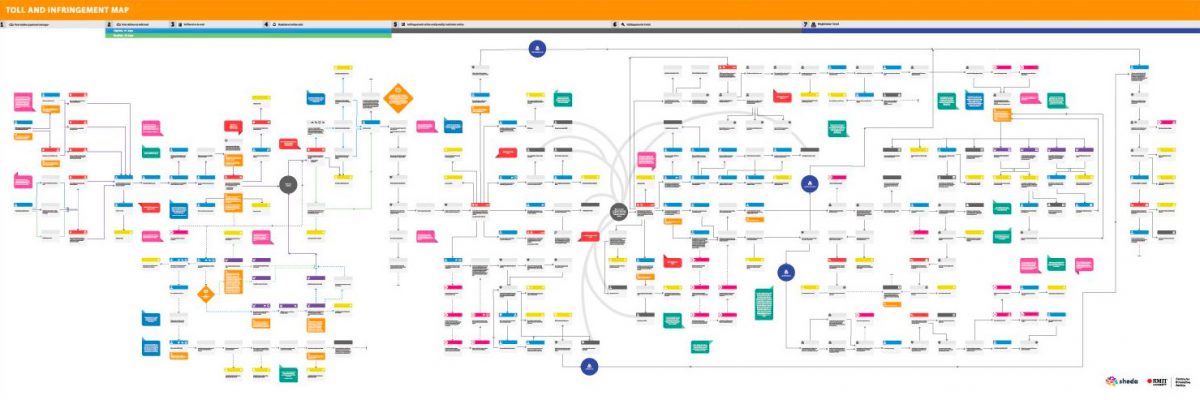For whom design tolls
In mid 2016, a coalition of community and legal assistance sector organisations sought the Centre’s assistance to facilitate a critical conversation on overhauling Victoria’s toll fines system.
In mid 2016, a coalition of community and legal assistance sector organisations sought the Centre’s assistance to facilitate a critical conversation on overhauling Victoria’s toll fines system — a system that is placing unsustainable pressure on Victoria’s Magistrates’ Courts, support services, communities and families.
With the support of the Victorian Minister for Roads and Road Safety, Luke Donellan, the CIJ brought together key stakeholders from toll operators through to government departments, the magistrates court and the legal assistance sector; probably the first time the ‘system’ had been brought together in one place to gain a shared understanding of the tolls infringements system and its impact on the criminal justice system and community more broadly, and to identify potential options to reduce the burden on the criminal justice system.
Using design thinking methodology, and guided by design thinking firm, Sheda, the workshop took on the design challenge of: how might we redesign the toll infringements system for all road users, so that: high-levels of compliance are maintained; there is early intervention so that people in genuine hardship don’t get caught in a spiral of fines/debt and ultimately a conviction or jail; pressure is taken off our courts and justice system so that resources can be more effectively deployed to areas such as family violence and so that it is consistent with government values and the desire of toll operators to ensure that ‘time is better spent’ and that transport truly ‘strengthens communities’.

From that workshop, a ‘journey map’ of the system was completed and series of workshops held to generate ideas and solutions. The outcomes of the process to date have confirmed the value of design thinking in law reform as well as the important role that universities can play in providing a ‘third’ or ‘neutral’ space to allow discussion, debate and genuine problem solving to take place. Here are the views of some of the participants:
“The CIJ has been instrumental in advancing reforms of how toll infringements are enforced. Its credibility as an objective body leading policy development using human centred design thinking was fundamental to firstly bringing a range of organisations together, and secondly providing a framework to consider entrenched issues with a new perspective.
Over a series of workshops, participants with deep knowledge of their specific part of the system were able to test assumptions and collectively develop a shared understanding of problems, including system pressures and unnecessary complexity for individuals. Participants relaxed their limited institutional view of the problems, and together developed a shared ethos that underpinned discussions of how the system might be redesigned from the perspective of the toll road user, to ensure compliance was maintained by a simpler and fairer system.
Outcomes from the design processes include the development of unexpected alliances, and a shared vision of reform developed with and presented to decision makers. Considering systems from the perspective of the user simply makes sense, but is often overlooked by agencies and organisations with their own history and interests. The collaborative and creative approach facilitated by the CIJ has been instrumental to quickly developing reforms that we all agree on, and which are therefore persuasive to decision makers. The outcome will be a toll fine enforcement system that has less impact on the justice system and publicly funded support services, and is fairer for individual toll road users.”
Damian Stock, Managing Lawyer – Economic and Social Rights, VLA
“The importance of this forum first and foremost was in the establishment of relationships across the different segments of fines enforcement. Prior to this forum, I am unaware of where stakeholders from all parts of the complex process had been brought together. By enabling the formation of relationships across a diverse group of stakeholders, this enabled reform processes to commence. The commencement of discussion with Fines Victoria in conjunction with VLA around the ability to withdraw tolling infringements is one example of this.
From a personal point, understanding further about the challenges that exist in different parts of the system, specifically in the Magistrates Court and the agencies supporting this process, has facilitated raising these concerns within Transurban and a focus on solutions to address these.”
Neil Smith, Enforcement Change Manager, Transurban
“The design thinking workshops enable the participants to break down the toll fines processes and determine a range of workable options for providing relief to vulnerable clients in financial hardship.”
-Denis Nelthorpe, CEO, WEstjustice
“The CIJ’s resources, expertise, networks, time and willingness to share all this has meant the toll fines coalition work has moved faster and achieved more coherent and wider-ranging results. Thanks a lot to Mark Madden for your dedication and mentoring over the last year and a bit!”
Shifrah Blustein, Project Lawyer, WEstjustice
“The CIJ embarked on a daunting challenge, using human centred design workshops to bring together parts of the infringements and tolling system who had been pulling in different directions and had seemingly competing interests to solve a $1.5 billion problem. The process produced exceptional results, developing unlikely partnerships and creating opportunities where none previously existed; proving the value of human centred design and design thinking in law reform.”
Brendan Lacota, Principal Lawyer, Moonee Valley Legal Service